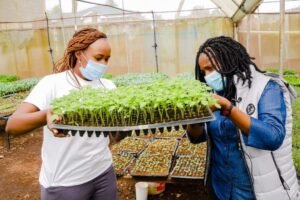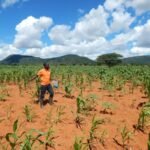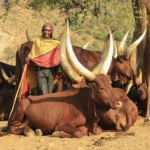By Marion Wagaki, Rootooba, 25 June, 2020
Kenya has over one million small-scale dairy farmers who keep over 70 per cent of approximately four million cattle producing about 4.3 billion litres of milk every year.
The official estimates by the Kenya National Bureau of Statistics (KNBS) show that the Kenya population presently stands at 50 million and is projected to grow to 96 million by 2050—pilling pressure on food supplies. As a consequence, the demand for animal-based foods will increase exponentially, requiring a transformation of the livestock sector.
Embracing technology in the livestock sector and producing climate change resilient and high yielding animals will be key in achieving the big four agenda on food security. State Department for Livestock and Fisheries Chief Administrative Secretary (CAS) Chebii Kilimo says.
Speaking recently when she launched the Kenya Animal Genetic Resource Centre (KAGRC) strategic plan 2018-2022, Kilimo noted that most of the livestock in Kenya are reared in the Arid and Semi-Arid Lands (ASAL) of the country, which constitute close to 80 per cent of the country’s land mass. Subsequently, improving the breeds in these areas will translate to tremendous economic improvement for the regions and the country at large.
“The government is firmly behind KAGRC’s quest towards improving the livestock breeds in the country and has already allocated Kshs.400 million for the dairy goat multiplication center in Kirinyaga which is 90 percent complete”, the Kilimo said.
She added that the goat Artificial Insemination (AI) center would be the first one in Africa.
“Despite COVID-19 related challenges, our scientists are working hard and we want to thank them for their efforts towards improving the breeds of our country since agriculture is our backbone,” she noted.
The CAS committed to availing AI services to goat farmers in ASAL areas by next year, aimed at increasing milk production from one litre to 8 litres per day per goat.
Commenting on the ‘Kienyeji’ chicken multiplication project dubbed Road runner chicken, Kilimo noted that KAGRC had prepared a concept note that required about Kshs.200 million to be actualized.
“The ‘Kienyeji’ chicken will give women in rural areas financial freedom because they can sell and get income to attend to household needs without having to engage their husbands to discuss whether to sell or not,” she said.
The CAS further added that women could also embrace the rearing of goats which produce nutritious milk that is in high demand in hospitals and amongst the elderly.
KAGRC board chairman Dr. Geoffrey Kamau mentioned that AI is a game-changer in the livestock industry and improving the breeds in rural areas will ensure maximum production of livestock products.
“We have enough stock of semen and we would like to urge our farmers to come forward and embrace AI so that we can improve the livestock breeds in the country”, he said.
Dr. Kamau further noted that they had 62 agents spread across the country who would avail the semen to the farmers through the Memorandums of Understanding (MoU’s) that had been signed with county governments.
Annually KAGRC produces over one million straws of semen compared to the 600, 000 straws demanded by farmers and has called on the farmers to embrace technology to provide quality meat and milk.
“We have the liquid nitrogen plants which ensure proper storage of semen as it is delivered to the farmers and at subsidized rates. Since we avail it at Kshs.200, our agents can put a markup and sell the semen at Kshs.500 to the farmers, which is relatively cheap,” said Dr. Kamau.
The dairy enterprise in Kenya has been estimated to earn farmers over 100 billion shillings annually from milk sales and employs over 350,000 people at farm level and over 400,000 people in the informal sector, and close to 50,000 people in the formal sector.







